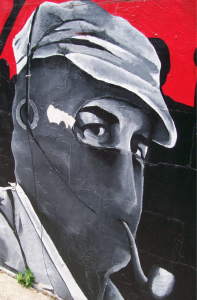The Birth, And Death, Of My Chicano Activist Career
 If the death of Cesar Chavez in 1993 ushered my rebirth as a Chicano, then the Zapatista uprising of 1994 only cemented it. Before that moment, I considered myself to be an anointed American. I could grow up to be president if I wanted.
If the death of Cesar Chavez in 1993 ushered my rebirth as a Chicano, then the Zapatista uprising of 1994 only cemented it. Before that moment, I considered myself to be an anointed American. I could grow up to be president if I wanted.
However, once I ventured out of my rancho of Boyle Heights, I began to notice that the world had a different attitude. My fellow Americans chanted for me to go home — even though I was already there. The day after Proposition 187 was passed, my classroom looked like the last week of June instead of the first Wednesday in November. I soon came to realize that when people wanted me to go home, they were not referring to East Los Angeles.
They wanted me to make the long trek back to what they thought was my motherland. At that time, Mexico meant nothing than a humid vacation destination where people would come up to me, shake my hand and tell me that we were related through an elaborate genetic roadmap.
At first my mother embraced my social activism.
She would stay up late at night in order to catch a badly shot glimpse of me as the camera would pan into the crowd during a rally. I went deep into it, although I was my own third party. I was too square to fit in with the hippies. I was too “Republican looking” to fit in with the long-haired Mechistas. I never really fell in with any groups because I have always found that you cannot bleed a cause without embracing someone else’s ideology.
Political causes cannot be like religions. Only insane people live and die with their party causes. There just comes a time when you have to cross the line. The Mechistas of the time mistrusted everyone. They were caught up in some un-evolved sense of egoistic self-importance intoxicated with the belief that J. Edgar Hoover himself had risen from the grave to run the zombie version of COINTEL-PRO in order to destroy their efforts.
Meanwhile the hippies talked a good game. They had absolute inclusion, but the flaw in their designs was the fact that nothing was ever done. However that same inclusion made their voices homogenized. They would not take a stand, but rather take a watch and see approach so that they could condemn the aftermath. Inaction was their drug of choice. Marijuana was a close second.
Although at the time I considered myself to be Chicano — even Xicano — for a couple of weeks in 1998, I could never really fit in. I never felt that I never had the proper credentials because most Chicano-themed meetings became duels to see who managed to be “the most Mexican” while claiming an American birthright. My sense of history was all wrong. Although I listened to Rage Against the Machine, I did not know all the lyrics to all the songs. I could never claim Paquita del Barrio as my madrina. I cannot claim to have weaved a soul patch out of Che Guevara’s whiskers.
So now, I simply go as Mexicano born in the United States. I know it is a mouthful, but it beats going out as the artist formerly known as something else. The way I see it, my mother’s baby plumbing mechanisms were Mexican, so why would I stop being Mexican? The geographical landscape might be different, but you can always count on the political landscape to remain the same.
Follow Oscar Barajas on Twitter @Oscarcoatl
[Photo By 20Letters]
